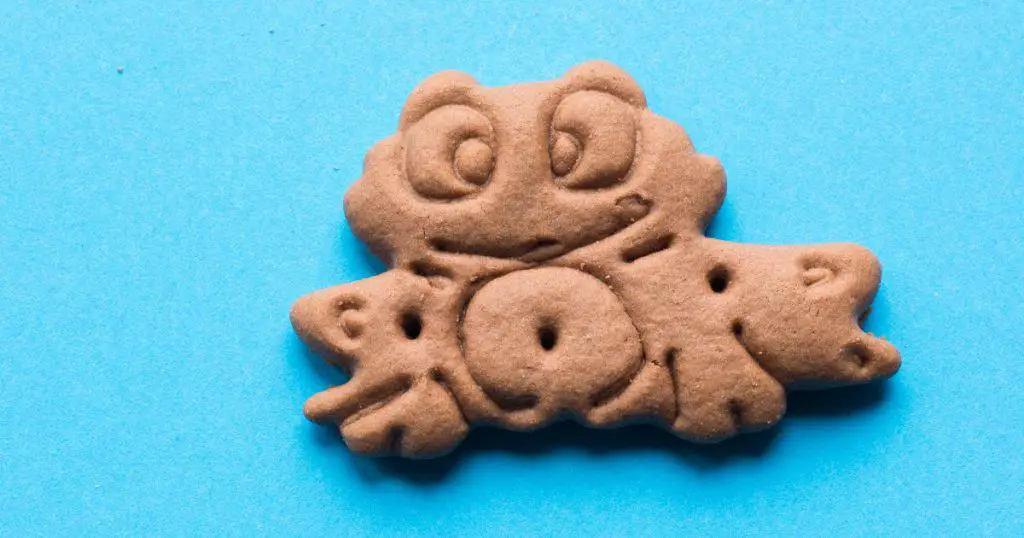What to Know
If you’re a dog owner, you may have wondered if it’s safe to give your furry friend animal crackers as a treat. After all, these snacks are a popular choice for humans and often come in fun animal shapes that are hard to resist. But can dogs eat animal crackers? The answer is yes, but with some important caveats.
First and foremost, it’s important to make sure that the animal crackers you’re giving your dog don’t contain any harmful ingredients. Specifically, you’ll want to check the label to ensure that there is no chocolate or xylitol present.
Both of these substances can be toxic to dogs and should be avoided at all costs. If you’re unsure about whether a particular brand of animal crackers is safe for your pup, it’s always best to err on the side of caution and avoid giving them to your pet altogether.
Assuming that the animal crackers you’re considering are free of harmful ingredients, it’s still important to keep in mind that these snacks should only be given to dogs in moderation. While animal crackers are not toxic to dogs, they are not a nutritionally balanced food and should not make up a significant portion of your pet’s diet.
In this article, we’ll explore the topic of dogs and animal crackers in more detail, including the potential benefits and risks of giving your pet these snacks, as well as some alternative treat options to consider.
Overview of Animal Crackers
Animal crackers are a popular snack that has been around for over a century. These crackers are shaped like different animals and are often enjoyed by children and adults alike. They are made from a simple recipe that includes flour, sugar, and other ingredients that give them their unique flavor and texture.
Animal crackers are a low-cost snack that can be found in most grocery stores. They are often marketed to children as fun and playful snacks. However, many people wonder if it is safe to give animal crackers to their dogs. While animal crackers are not toxic to dogs, there are some things to keep in mind before giving them to your furry friend.
One thing to consider is the high sugar content in animal crackers. Dogs do not require the same amount of sugar in their diet as humans do, and too much sugar can lead to health problems such as obesity and diabetes. Additionally, some animal crackers may contain artificial sweeteners such as xylitol, which is toxic to dogs.
Another thing to keep in mind is the high salt content in some animal crackers. While salt is an essential nutrient for dogs, too much can lead to dehydration and other health problems. It is important to monitor your dog’s salt intake and limit the amount of animal crackers they consume.
Can Dogs Eat Animal Crackers?

Animal crackers are a popular snack among children and adults alike. But can dogs eat animal crackers? The answer is yes, but with some precautions.
Animal crackers are generally non-toxic for dogs. However, before feeding your dog an animal cracker, make sure it doesn’t contain chocolate or xylitol. Chocolate is toxic to dogs and can cause vomiting, diarrhea, and even death. Xylitol is a sugar substitute commonly found in sugar-free products, including some animal crackers. Xylitol can cause a rapid insulin release in dogs, leading to hypoglycemia (low blood sugar), seizures, and even liver failure.
Technically, animal crackers are not toxic to dogs, so your pup won’t drop dead after gulping down a few of these crackers. However, they may cause some digestive upset, especially if your dog eats too many. Animal crackers are high in carbohydrates and calories, which can lead to weight gain and obesity if fed in excess.
If you want to give your dog an occasional animal cracker as a treat, make sure to choose plain, unsweetened crackers. Avoid flavored or frosted crackers, as they may contain harmful ingredients. Also, keep in mind that animal crackers should not replace your dog’s regular diet. Dogs have different nutritional requirements than humans, and feeding them too many treats can disrupt their dietary balance.
In conclusion, dogs can eat animal crackers, but only in moderation and with caution. Always read the ingredient label before feeding your dog any human food, including animal crackers. If you have any doubts or concerns, consult your veterinarian.
The Risks of Feeding Animal Crackers to Dogs

Choking Hazard
Animal crackers can pose a choking hazard for dogs because they are often dry, brittle, and crumbly. If your dog is a fast eater or tends to swallow food without chewing, it is best to avoid giving them animal crackers altogether. Small pieces of crackers can get stuck in their throat or cause blockages in their digestive system, leading to serious health problems.
Digestive Problems
The ingredients in animal crackers can irritate your dog’s stomach lining and lead to vomiting or diarrhea. The high sugar and fat content in these treats can cause digestive upset and even pancreatitis in some dogs. If your dog has a sensitive stomach or a history of digestive problems, it is best to avoid giving them animal crackers.
Obesity and Diabetes
Animal crackers are high in calories and sugar, which can lead to weight gain and obesity in dogs. Overfeeding your dog with these treats can also increase their risk of developing diabetes and other health problems. It is important to limit your dog’s intake of animal crackers and other high-calorie treats to maintain their overall health and wellbeing.
Alternatives to Animal Crackers for Dogs

Fruits and Vegetables
Fruits and vegetables are a great alternative to animal crackers for dogs. They are packed with essential vitamins and minerals that are beneficial to your dog’s health. Here are some of the best options:
- Carrots – Carrots are a great source of vitamin A, which supports healthy eyesight in dogs.
- Apples – Apples are high in fiber and can help improve your dog’s digestion.
- Blueberries – Blueberries are packed with antioxidants and can help boost your dog’s immune system.
- Bananas – Bananas are high in potassium and can help regulate your dog’s blood pressure.
When giving your dog fruits and vegetables, make sure to cut them into small, bite-sized pieces to prevent choking. Also, avoid giving your dog grapes, raisins, onions, and garlic as they can be toxic to dogs.
Dog-Friendly Treats
If you’re looking for a more traditional dog treat, there are plenty of options available that are safer and healthier than animal crackers. Here are some of the best dog-friendly treats:
| Treat | Benefits |
|---|---|
| Bully sticks | High in protein and low in fat, bully sticks are a great alternative to animal crackers. |
| Peanut butter | Peanut butter is a tasty and healthy treat for dogs, as long as it doesn’t contain xylitol. |
| Cheese | Cheese is a great source of protein and calcium for dogs, but should be given in moderation due to its high fat content. |
When giving your dog treats, make sure to read the ingredients and avoid any that contain artificial preservatives or additives. Also, make sure to limit the amount of treats you give your dog to prevent obesity and other health issues.
Before You Go

After researching whether or not dogs can eat animal crackers, the answer is not a clear-cut yes or no. While animal crackers are not toxic to dogs, they are not a healthy snack and should only be given to your furry friend on occasion. It is important to monitor their intake and make sure they do not eat too many.
Animal crackers are high in sugar and fat, which can lead to obesity and other health issues if consumed regularly. However, plain and some other flavors of these crackers are safe for dogs to eat in moderate amounts, while others are not safe, not even in small quantities.
If you do give your dog animal crackers, it is important to carefully read the ingredients list and avoid any flavors that contain harmful ingredients like chocolate or xylitol. It is also important to remember that while some human foods may be safe for dogs to eat, they should never replace a balanced and nutritious diet specifically formulated for their needs.
In conclusion, while it may be tempting to share your snacks with your furry friend, it is important to prioritize their health and well-being by sticking to a balanced diet and only giving them treats in moderation. Always consult with your veterinarian before introducing any new foods to your dog’s diet.

